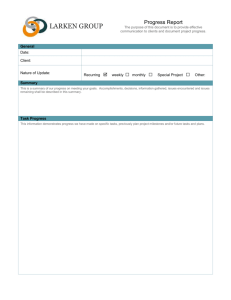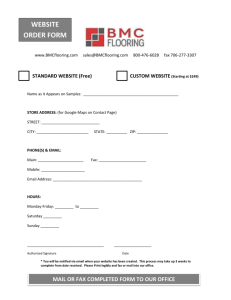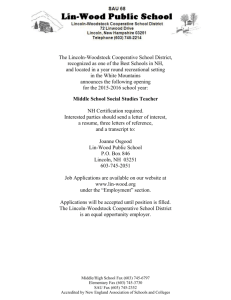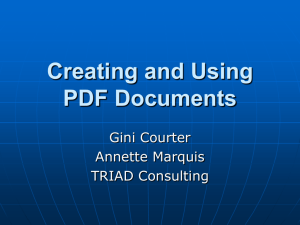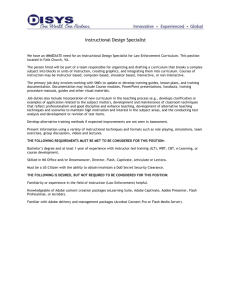What is a PDF Document?
advertisement
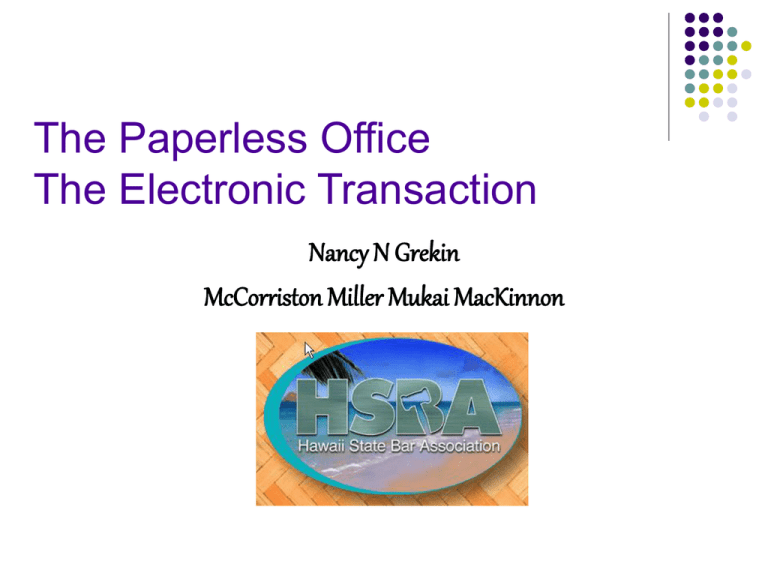
The Paperless Office The Electronic Transaction Nancy N Grekin McCorriston Miller Mukai MacKinnon Take a Walk Down Memory Lane 1970’s Mark up forms or the last document you used in a deal with a pencil Hand to the secretary to type on her Selectric Mail the work product to the client Send by FedEx if out of town 1980’s The fax appears Documents can be sent across country in minutes Faxes on thermal paper curled up while trying to read them and faded out if you stored them in the file The Recent Past 1990’s E-mail Instant gratification! A document can be anywhere in the world in an instant All the documents in the deal are cluttered in your e-mail in-box or directories with little clue of which version is which or who sent it when The 21st Century All documents uploaded to a secure password protected site on the Internet All team members can get access to any document at any time if they have an Internet connection Perfect version control, contact lists with e-mail hyperlinks and chat capabilities for discussion Extranets and Deal Rooms Hosted and Server-Based Hosted extranets or deal rooms are Web sites with password protected access Server Based Some are free Paid sites are sold by the amount of storage required Purchased programs hosted at the law firm’s server Password protected access to clients Must purchase licenses to cover clients and lawyers Link to DMS for document upload and download Features Document storage and version control Users can upload, download and comment Discussions Contact lists Calendars Why Use Extranets and Deal Rooms? Central storage of documents calendar of events checklist status version control Avoids need for e-mail to transmit documents Separate secure areas Password protected Each team member has access Access to documents can be restricted Secure backup at separate geographic locations Free Extranets and Deal Rooms Yahoo Groups (Hosted) Designed for use as a discussion group File upload Listserv style discussion Database capability allowing contact lists Password protected access Microsoft Sharepoint (Software Based) Free with purchase of Microsoft Server 2003 Password protected access Contact list Discussion but not listserv style File upload Flexible libraries of documents, lists of tasks with customizable fields Extranet Software Document management systems sell companion extranets DMS’ also sell modules to integrate with third-party extranets DMS integration allows direct upload and download of documents Version control Discussion Contact lists Microsoft Sharepoint (full version) IBM Quick Place iManage Deal Rooms Intralinks eRoom CynOps from TyMetrix Deal Central Net Documents Merrill e-Collaborate T-Lex The Paperless Transaction Document drafts Why print? Store on your computer and when the deal is done back up to CD Paperless issues Uses resources Takes up space in files Kills trees Naming conventions Version control Your computer is your filing cabinet and you must keep it as organized as the real thing Frequent back up to secure the data Document Naming DMS If you use a DMS, use its feature which will associate documents with each other Begin the name with the name of the client or the deal so when it appears in your work list you can sort or search by that name Don’t torture your opposing counsel by emailing documents with names like “1K345Q!” Directory system Use directories named by client or document subject (such as “Leases”) Name the document by subject or client Version Control Use the version control feature of your DMS and don’t give new versions new names If don’t use a DMS follow consistent naming convention Maintain the name of the document through all drafts Name the documents “NameRV1”, “NameRV2” Name the redlines “NameRd1”, “NameRd2” New versions from the other lawyer Many DMS’ permit import as a new version of an existing document Try to maintain your naming conventions in a directory file system by giving new drafts of documents sent by other lawyers consistent names The Paperless Office Some firms have gone entirely paperless scanning everything that comes into the office Requires a plan for storage, back-up, retrieval and filing on the computer system Integration with case management programs enables client or matter centered storage of documents Why Paperless? How much time do you spend looking for documents in files? If 1 hour a day is spent, 48 weeks a year, and the lawyer charges $225 per hour, the lawyer has lost $54,000 in billable time looking for things! Paperless is a state of mind requiring Giving up on the paper-based system of keeping track of client documents and records Learning to use electronic document management tools Implementation Requires A body to scan Lawyers willing to give up paper A disciplined system of naming and storing documents A scanner or scanners Image management software Case management software integration Ethical issues of security Truly erasing hard drives when computers taken out of service Security of network Scanners Sheet fed such as Visioneer Strobe Small upright scanners with automatic document feeder Larger flat bed with automatic document feeder All manufacturers of copiers also make scanners and a few independent companies Factors in choosing Speed Image management software supported Need for ADF Scanner Capabilities Scanners on the network can scan and email to lawyers Scan to PDF format Need a high speed with an automatic document feeder Some scanners combine scanning with copying and faxing Image Management Software Programs which allow you to fax, e-mail, save and print scanned images PaperPort Fax the image Print an image to the PaperPort desktop Form filler Newest version scans to PDF E-mail the image Print the image Save the image in directories on the network or at the program desktop OCR to Word or WordPerfect Simple search creates internal searchable OCR Paperless Security Issues Back up: paperless offices must back up frequently and store back-up off-site for recovery Off site storage: back-up media must be stored off-site or backed-up to Webbased extranets Disaster recovery: paperless with backups stored off-site or on the Web is the perfect disaster protection Acrobatics with Adobe Adobe Reader is free and allows you to read PDF documents only Cannot save Cannot edit or create smart forms Print only Adobe Acrobat allows you to create a PDF document from any application which prints To the computer Acrobat is a printer so you create a PDF document by selecting it as your printer Advanced features implement and complement the paperless office What is a PDF Document? PDF = “Portable Document Format” A PDF document is a picture of the text and graphics on a page Two kinds of PDF documents Image on text: documents which were printed to PDF from an application Image only: documents which were scanned Many useful features of Acrobat which facilitate organization of documents work only on image on text PDF documents Adobe Acrobat integrates with Word Installs icons on your toolbar which allow you to create a PDF document from a Word document create and e-mail a document directly from Word but only if you use Outlook A document printed to Acrobat from an application can be searched within Acrobat, the text edited, comments inserted and listed in a separate index Features of Adobe Acrobat Create smart forms Review and comment Review and comment by e-mail Summarize and export comments Extract text from image-on-text PDF documents OCR image-on-text documents by “saving as” .txt format Create electronic signatures Compare two PDF documents Add hyperlinks to Other documents Locations within the document Web sites Insert, delete, move and extract pages E-Mail Etiquette Proliferation of e-mail to transmit documents = proliferation of problems in receiving and managing them The word processors If you still use WordPerfect don’t send in that format unless you ask if the recipient runs the program Convert to PDF if recipient doesn’t run your program Be bi-lingual and capable of working in native code in both programs Don’t open files created in one program in the other or you risk document corruption Printing E-Mailed Documents Pagination is printer-dependent E-mail the same document to 5 lawyers with 5 printers and you’ll get 5 different paginations Convert documents sent for execution to several different places to PDF Adobe Acrobat is worth the price because it enables you to convert to image format and avoid this issue Effective Use of E-Mail Formatting E-Mail RTF Good news: allows you to use Word features such as automatic spell check and formatting like bullets and automatic numbers Bad news: reformats attachments and recipients who don’t use Outlook won’t be able to open the attachments HTML Allows formatting such as bold, italic and underline Allows automatic numbering and bullets But recipients who don’t have their mail client formatted as HTML won’t see formatting and may see a run on message Appearance Counts Use a signature at the end of your e-mails Use the automatic spell checker before sending emails Format personal information so that the “From” window includes your name An e-mail to a client or another lawyer is a business letter Use paragraph breaks Use punctuation Don’t send run-on e-mails If it exceeds a couple of paragraphs maybe a phone call is better! Taming the Fax Monster A bold suggestion: give up your fax machine! Using fax machines requires Equipment maintenance and replacement Human resources – several to send and receive every fax $$$$$$ !!!!!!!!!! Clients don’t like being charged for faxes Use software based or Internet fax One time purchase of software, a fax server to run the program and a phone line for software-based Nominal per fax charge for Internet based but no long-distance charges Fax Software Most popular are RightFax and WinFax Address book Keeps track of client numbers so you can charge to file Faxes are received as attachments to email in TIF or PDF format Receive while traveling at your laptop Forward as e-mail to others Permanent electronic record Disadvantage: need extra phone lines Internet Fax Fax is sent over the Internet No long distance charges No need for a phone line because no modem is required eFax and Maxemail can fax from a mail client by addressing to faxnumber@efaxsendcom or faxnumber@maxemailsend.com If an fax is sent from the mail client it can be simultaneously e-mailed to someone else Features of Internet Fax Free account Paid account eFax and Maxemail offer free in-bound faxes You are assigned a phone number but can’t choose area code You can choose the area code of your phone number eFax offers 808 numbers $10 activation fee plus $8.95 a month to maintain 5¢/page to send Maxemail allows sending faxes from its Web site with the ability to store fax numbers there Fax numbers can be stored in the mail client just like e-mail addresses as faxnumber@maxemailsend.com Document Assembly Why use? Speed of document production Quality control or forms How does it work? Three basic elements of documents Variables Static text Conditional language Document assembly programs enable intelligent assembly using logic to determine text and formatting of variables and whether or not to use conditional language What is a Document Assembly Program Works inside the word processors Create templates from existing documents in the word processor by programming the logic Incorporate logic into existing forms in the word processor using a toolbar which appears when you open the program Logic enables intelligent document production and eliminates the need for tedious typing changes to standard forms Features of Document Assembly Software Variables Text Date Number True/False Multiple Choice Conditional variables Ability to create complex computations like macros which will execute a series of instructions Create logical dialogs to collect variables Ability to interface with databases Ability to assemble documents on-line and create clientfacing forms Why Use Document Assembly Software Avoids the pitfalls of “forms” Lawyers often use the documents from a deal with deal-specific information as “forms” Danger of not remembering what was specific to that deal or not changing it for a new deal Enables flat fee value billing Limits clerical needs Vastly speeds up document production Assemble multiple documents simultaneously so all documents in the transaction with same variables can be created at once Changes can be incorporated by re-assembly requiring no retyping Available Products Software to develop templates for own work product HotDocs GhostFill ThinkDocs FastDraft QShift Creating Templates Programmed templates are available in many practice areas Learn to program yourself or have a paralegal or IT support person learn Hire professional programmer Two local programmers Many national programmers Return on investment is high because it enables high yield flat fee billing Demonstration of Assembly of Templates Assemble multiple templates simultaneously inserting the same variables but type only once Change the answers and reassemble Use answers in documents later to prepare additional documents Share templates and answers on a network Billing for Production of Automated Documents What if preparation took 3 hours the oldfashioned way and 30 minutes using document assembly? Document assembly enables flat fee “value billing” Clients value timely preparation more than anything else Clients want known legal fees for services before the work is done If the client agrees to a flat fee it is perfectly ethical to charge a fee which does not reflect the time spent Power Up! Most users do not use the power codes the word processors offer Secretaries are set in the ways an don’t want to try the features Lawyers don’t know the features exist and don’t train their staff Huge investment in hardware and software doesn’t yield a return on investment Use of power features speeds up document production, reduces need for clerical assistance and improves profitability Power Features Automatic paragraph numbering Cross Reference Columns and tables Word form fields Word field codes Word Perfect templates Autocorrect | Autotext | QuickCorrect Toolbars Merge Creating an Electronic Closing Binder What you will need Adobe Acrobat (Full version – not Adobe Reader) Scanner Autorun Program such as Autorun Wizard CD-RW drive and software to create labels What You Will Do Create an index in a word processor Graphics can be included Click on Insert/Picture/From File (or other source) Right click on image to format size Click and drag image to desired position Print the index to Adobe Distiller to create a PDF version Open the Index in Adobe Acrobat and create Internet links and/or links to the documents listed in the index Create an Autorun file so that the index opens when the CD is inserted in the drive Create an Index Insert a picture or other graphics in the index: Insert/Picture/From File Type the index in the word processor Use colors, bullets and graphics Create Document Links All documents to be linked from the index should be in the same directory. Click on the “Link” tool. A crosshair “+” will appear. Drag it around the words you want to be the link and release the mouse. The Link Properties dialog box will open. Select “Invisible Rectangle” for Type and “Open File” for Action. Click on “Select File” and a file open dialog will open. Scroll to the file you want to open and click “Set Link” and OK. Insert Scanned Signed Pages in The Documents Print all documents to go to the CD to PDF before execution. Pagination is printer dependent so documents to be e-mailed for execution will have different pagination if printed on different printers but will be the same no matter where printed if in image format. Delete the unsigned signature pages from the original PDF document by selecting “Thumbnails” and right clicking on the page to be deleted. Select “Delete pages” and hit enter. The page will be deleted. Insert Signed Pages in The Document Scan the signed pages and save as a PDF file. Open the document in which you want to insert the pages in Adobe, click on “Thumbnails”. Right click on the page after which you want to insert the pages and click on “Insert Pages.” A file open dialog box will appear. Click on the file you want to insert and OK. A dialog box will appear asking if you want to insert the pages before or after. Select “After” and OK. Create Autorun Files Create the Autorun Files using Autorun Wizard or similar product Windows recognizes a filed named “Autorun.exe” on a CD as an instruction to open a file The file tells Windows to open a file The file opened will be the index Specify the Base Folder Put all of your documents to go on the CD in this folder including the autorun executable and related files. Click on the yellow folder to the right of the window and a file open dialog box will open. Scroll to the directory where the documents are located and click OK. Select the File to Launch Click Autolaunch and “Launch a File Located on the CD-ROM” and specify the name of the file to launch when the CD is inserted the drive. Save the autorun files to the same directory as the documents to go to the CD Copy all of the files in the directory including the 3 autorun files you created to your CD and your CD will autorun the index Create CD labels My Favorite Utilities Shorthand Google Toolbar Google Deskbar Snagit Autorun Wizard Opera Browser Mozilla Browser Windows Character Map $89.95 Free! Free! $39.00 Shareware Shareware Shareware Windows Accessories The Eternal Question: What Will it Cost? Visioneer Strobe Pro Scanner Adobe Acrobat Professional Autorun Wizard HotDocs (2 licenses of Standard) PaperPort 9 Total $ 299.00 $ 449.00 $ 00.00 $ 500.00 $ 80.00 $ 1,328.00
